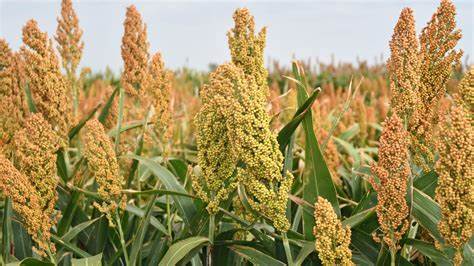Sorghum (Sorghum bicolor) – Unveiling Healing Properties and Benefits!

Sorghum (scientifically known as Sorghum bicolor) is a fascinating cereal grain with a rich history. Sorghum bicolor, commonly called sorghum and also known as great millet, broomcorn, or guinea corn. The grain is used for food for humans; the plant is used for animal feed and ethanol production.
Sorghum originated in Africa and is now widely cultivated in tropical and subtropical regions. It’s the world’s fifth-most important cereal crop, following rice, wheat, maize, and barley.
The Herbal Benefits of Sorghum (Sorghum bicolor)
Sorghum (Sorghum bicolor) offers several herbal benefits due to its rich nutritional profile.
- Antioxidant Properties:
- Sorghum contains antioxidants that help protect cells from oxidative damage.
- These antioxidants contribute to overall health and may reduce the risk of chronic diseases.
- Anti-Inflammatory Effects:
- Some compounds in sorghum exhibit anti-inflammatory properties.
- Consuming sorghum may help manage inflammation in the body.
- Blood Sugar Control: Its low glycemic index makes it suitable for managing blood
- Cholesterol Management:
- Regular sorghum consumption may help lower cholesterol levels.
- Its soluble fibre content supports heart health.
- Potential Cancer Prevention:
- Certain components in sorghum, such as 3-deoxyanthocyanidins (like luteolinidin and apigeninidin), have chemopreventive properties.
- These compounds may play a role in reducing cancer risk.
- Type 2 Diabetes Support:
- Sorghum’s low glycemic index makes it suitable for managing blood sugar levels.
- Including sorghum in your diet may benefit individuals with diabetes.
Remember, sorghum is versatile and can be incorporated into various recipes. Whether you choose whole grain sorghum, pearled sorghum, or sorghum syrup, it’s a nutritious addition to your meals!
The Chemical Properties of Sorghum (Sorghum bicolor)

Sorghum (Sorghum bicolor) is a fascinating cereal grain with diverse chemical properties.
- Hydrocyanic Acid (HCN) Content:
- HCN is present in sorghum and can be toxic if consumed in large quantities.
- Among grain sorghum varieties, the highest HCN content was detected in the Early Sumac variety, while the highest sprout HCN content was found in the IS407 variety.
- HCN content is influenced by factors like genetics and environmental conditions.
- Tannin Content:
- Sorghum contains tannins, which contribute to its antioxidant properties.
- Tannin levels vary across varieties, ranging from 131.66 ppm to 1405.83 ppm.
- Tannins are beneficial for health due to their potential anti-inflammatory effects.
- Crude Protein Ratio:
- The highest crude protein ratio was observed in the Leoti, Aldari, and IS407 varieties.
- Protein content is essential for overall nutrition and muscle health.
- Elemental Composition:
- Sorghum exhibits significant differences in elemental content across varieties.
- While it is rich in certain minerals, such as potassium (K), magnesium (Mg), and calcium (Ca), it has lower levels of phosphorus (P), zinc (Zn), iron (Fe), and copper (Cu) compared to other grains.
Remember, sorghum’s chemical properties contribute to its nutritional value and potential health benefits
How to use the Sorghum (Sorghum bicolor) as herbal medicines

Sorghum (Sorghum bicolor) is a versatile grain with various culinary and health benefits. Let’s explore its properties and how you can incorporate it into your diet:
- Nutritional Benefits:
- Sorghum is rich in essential vitamins, minerals, and antioxidants.
- A half-cup of uncooked sorghum provides approximately:
- Calories: 329
- Protein: 10g
- Fiber: 7.5g
- Iron: 3.7mg
- Magnesium, Potassium, and other nutrients.
- How to Use Sorghum:
- Whole Grain Sorghum: Cook it like rice or quinoa. Add to salads, side dishes, or pilafs.
- Pearled Sorghum: Cooks faster than whole grain. Great for soups.
- Sorghum Flour: Use it in gluten-free baking (pancakes, bread, muffins).
- Sorghum Syrup: A natural sweetener for desserts.
- Popped Sorghum: Nutrient-dense alternative to popcorn.
- Sorghum Leaves: Incorporate them into salads or cooked dishes.
Remember, sorghum is not only nutritious but also sustainable.
Safety and Side effect of Sorghum
Sorghum (Sorghum bicolor) is a nutritious grain with several health benefits. Let’s explore its safety and potential side effects:
- Safety:
- When consumed as part of food, sorghum is likely safe.
- However, there isn’t enough reliable information to determine its safety when taken as a medicine.
- Pregnant or breastfeeding individuals should consult their healthcare provider before using sorghum.
- Allergies:
- Sorghum can be an allergen for some people.
- Allergic reactions may include tingling or itching of the mouth, abdominal pain, nausea, vomiting, and fainting.
- Severe allergic reactions (anaphylaxis) are possible but rare.
- Digestive Effects:
- Sorghum flour, being a type of fibre, may cause gas and bloating in sensitive individuals.
- If you experience digestive issues, consider moderation.
Remember, if you have any specific health concerns or allergies, consult a healthcare professional. Enjoy sorghum in moderation as part of a balanced diet.
External links

